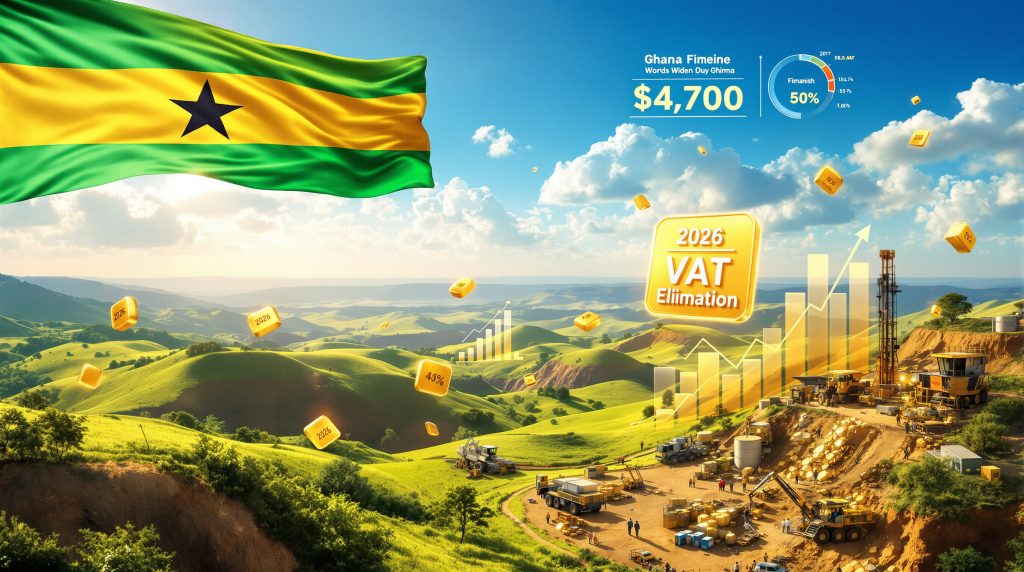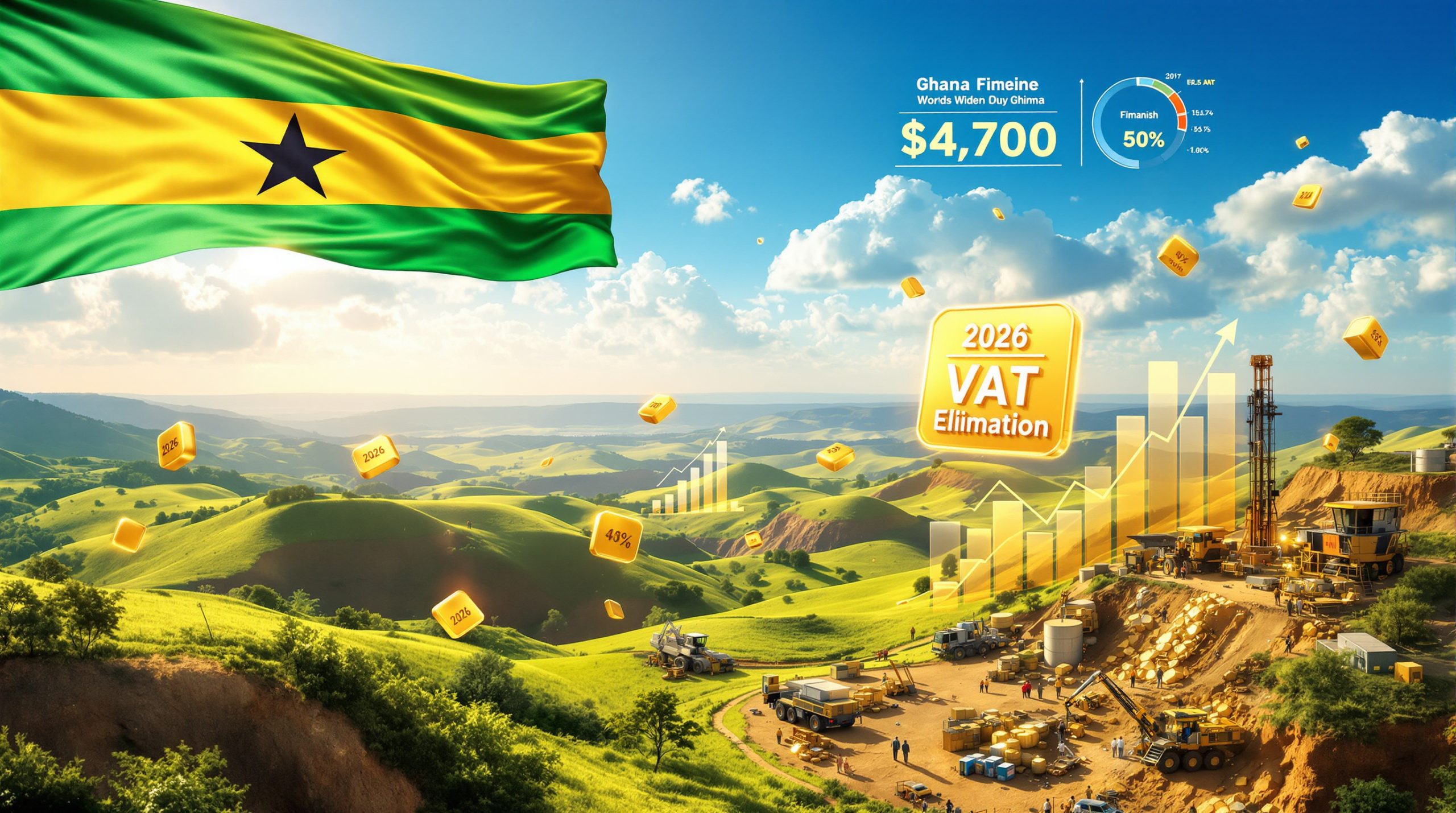Ghana's decision to eliminate value-added tax on mineral exploration represents a fundamental shift in the country's approach to attracting mining investment. This strategic policy change addresses decades of competitive disadvantages that have limited new project development across West Africa's premier gold-producing nation. The Ghana mineral exploration tax reform demonstrates the government's commitment to enhancing investment attraction whilst maintaining sustainable development practices.
The announcement by Finance Minister Cassiel Ato Forson during the 2026 budget presentation marks a pivotal moment for Ghana's mining sector, which generates over one-third of the country's export revenues. This reform comes as Ghana seeks to reverse more than two decades of limited new mining development and position itself more competitively within the West African mining landscape.
What Specific Tax Changes Are Being Implemented?
Complete VAT Elimination on Exploration Activities
The most significant change involves removing the 15% value-added tax previously applied to mineral exploration and reconnaissance operations. This tax elimination covers comprehensive exploration activities that were previously subject to substantial upfront costs. Furthermore, the reform addresses historical barriers that have constrained project development through the mining permitting process.
Covered Activities Include:
• Drilling operations and associated equipment costs
• Laboratory assaying and sample analysis services
• Geological surveying and mapping activities
• Environmental assessment and permitting processes
• Early-stage feasibility studies and technical evaluations
Timeline and Implementation Framework
| Implementation Phase | Effective Date | Coverage |
|---|---|---|
| VAT Abolition | January 2026 | All exploration activities |
| Registration Threshold Changes | January 2026 | Increased business registration limits |
| Export Control Updates | Ongoing | Enhanced monitoring systems |
The reform represents part of a broader VAT review intended to promote responsible mining practices while curbing unregulated prospecting activities. Additionally, this policy change reflects the importance of mineral exploration in maintaining long-term resource sustainability and economic growth across Ghana's mining sector.
Why Did Ghana Maintain Exploration Taxes for 25 Years?
Historical Context of Tax Implementation
The original 15% VAT on mineral exploration emerged during comprehensive fiscal reforms introduced approximately 25 years ago as part of wider governmental restructuring initiatives. This tax structure was implemented to generate revenue from foreign investment activities, create standardised taxation across mining operations, and establish regulatory oversight of exploration activities.
The tax was applied to exploration-related expenses such as drilling and assay work, significantly increasing upfront costs for companies operating during the high-risk early phases of mining projects. Consequently, this created substantial financial barriers during periods when project success remained uncertain and returns on geological investments were speculative.
Economic Impact on Investment Decisions
Industry analysis reveals that exploration VAT created upfront cost barriers that significantly impacted project economics during high-risk development phases. The Ghana Chamber of Mines argued that this tax structure discouraged greenfield investment and undermined Ghana's competitiveness compared to regional competitors offering more favourable exploration taxation frameworks.
However, similar challenges have emerged globally, with companies like Ferrexpo experiencing difficulties such as VAT refund suspension in other jurisdictions, highlighting the broader impact of tax policy on mining operations.
Critical Industry Assessment: According to Michael Akafia, President of the Ghana Chamber of Mines, the VAT on exploration negatively affected Ghana's competitiveness as a mining jurisdiction and created pipeline bottlenecks that constrained project advancement opportunities.
How Does This Reform Compare Regionally?
Competitive Analysis Across West Africa
Ghana's previous tax structure placed it at a significant disadvantage compared to neighbouring jurisdictions that had already implemented exploration tax exemptions or reduced fiscal burdens on early-stage mining activities. Moreover, the reform aligns with broader industry evolution trends observed across global mining markets.
Regional Competitive Landscape:
• Ivory Coast: Complete exploration tax exemptions
• Burkina Faso: Zero VAT on early-stage activities
• Kenya: Streamlined exploration incentives
• Mali: Reduced tax burden for reconnaissance operations
Investment Flow Implications
The competitive disadvantage created by Ghana's exploration VAT resulted in exploration budgets being diverted to lower-cost jurisdictions, reduced feasibility study investments in Ghanaian prospects, and limited greenfield project pipeline development. Industry groups consistently argued that this tax policy undermined Ghana's position within the West African mining investment landscape.
What Are the Expected Investment Outcomes?
Government Policy Expectations
Finance Minister Cassiel Ato Forson emphasised that the VAT abolition will revive investor confidence, stimulate greenfield activity, and ensure the long-term sustainability of Ghana's mining sector. The government positions this reform as essential for attracting international exploration investment that had previously flowed to more fiscally competitive jurisdictions.
Industry Response and Strategic Realignment
The Ghana Chamber of Mines has endorsed the reform, characterising the previous VAT structure as a significant impediment to project advancement through the development pipeline. Industry stakeholders expect enhanced feasibility study investments, accelerated drilling programme implementations, and increased participation from junior mining companies seeking cost-effective exploration opportunities.
Anticipated Investment Trends:
• Enhanced exploration budget allocations to Ghanaian prospects
• Accelerated feasibility study investments
• Increased drilling programme implementations
• New greenfield project discoveries
• Expanded geological database development
• Greater junior mining company participation
How Will This Impact Ghana's Gold Production Targets?
Current Production Performance Analysis
Recent data reveals significant momentum in Ghana's mining sector, with remarkable shifts in production contribution patterns during 2025. The country targeted total gold output of approximately 144.5 tonnes for 2025, with actual performance exceeding expectations across multiple categories.
| Production Category | Jan-Oct 2025 Output | Value (USD) | Historical Significance |
|---|---|---|---|
| Small-scale Gold | 81.7 tonnes | $8.1 billion | Exceeded large-scale for first time |
| Large-scale Gold | 74.1 tonnes | $6.6 billion | Consistent institutional production |
| Combined Total | 155.8 tonnes | $14.7 billion | Exceeds 2025 annual target |
Production Pattern Transformation
The data reveals a historic milestone where small-scale gold exports surpassed large-scale exports for the first time, reflecting the impact of recent regulatory reforms that have formalised artisanal mining operations and tightened export controls. Finance Minister Forson attributed this surge to institutional reforms addressing informal sector formalisation and export transparency.
Long-term Production Sustainability
The tax reform aims to address a critical challenge facing Ghana's mining sector: limited new mine development over the past two decades. By reducing exploration barriers, the government expects enhanced reserve replacement ratios, extended mine life projections, and diversified commodity production beyond gold.
Strategic Production Objectives:
• Enhanced reserve replacement ratios
• Extended mine life projections
• Diversified commodity production beyond gold
• Increased greenfield discoveries
• Sustainable long-term production growth
What Role Do Major Mining Companies Play?
Current Operator Landscape
Ghana's mining sector features significant international participation from established multinational corporations and emerging Asian investment entities. Major operators include established Western companies alongside growing Chinese state-owned and private enterprises.
Established International Operators:
• Newmont Corporation – US-based multinational operations
• AngloGold Ashanti – South African-based global producer
• Gold Fields – Diversified international mining company
• Perseus Mining – Australian-focused regional operator
Emerging Asian Investment:
• Zijin Mining Group – Chinese state-owned enterprise
• Cardinal Namdini – Chinese-backed development project
Strategic Implications for Corporate Planning
Large-scale operators are expected to reassess their exploration strategies following the tax reform implementation. The elimination of exploration VAT improves project economics for prospects that were previously considered economically marginal, potentially leading to increased budget allocations for Ghanaian exploration activities.
How Does This Reform Address Environmental Concerns?
Regulatory Modernisation Framework
Beyond tax elimination, Ghana's reform package includes enhanced environmental oversight mechanisms designed to balance increased investment attraction with responsible resource extraction practices. The government has implemented comprehensive regulatory improvements addressing environmental degradation concerns. In addition, these reforms complement modern approaches to mine reclamation innovation that ensure sustainable mining practices.
Environmental Protection Measures:
• Formalised artisanal mining regulations
• Strengthened export monitoring systems
• Improved forest and waterway protection measures
• Standardised environmental impact assessments
• Enhanced regulatory oversight of exploration activities
Sustainable Mining Development Goals
Policy Integration: The government frames VAT elimination within broader environmental protection objectives, emphasising that responsible mining practices and investment attraction are complementary rather than competing priorities.
Finance Minister Forson emphasised that the measure is intended to promote responsible mining and curb unregulated prospecting activities that have degraded forests and waterways. This approach reflects governmental recognition that environmental protection and investment attraction require coordinated policy frameworks.
What Are the Broader Economic Implications?
Export Revenue Dependencies and Economic Significance
Ghana's mining industry generates more than one-third of the country's export revenues, making sector growth critical for macroeconomic stability and foreign currency earnings. The sector is dominated by gold production alongside bauxite and manganese extraction activities.
Economic Impact Metrics:
• Export Revenue Contribution: Over 33% of total national exports
• 2025 Gold Sector Value: $14.7 billion (Jan-Oct combined production)
• Currency Earnings: Critical source of foreign exchange reserves
• Employment Generation: Significant direct and indirect job creation
Revenue Diversification Strategy
The tax reform supports broader economic diversification objectives by strengthening Ghana's position within global mineral supply chains while reducing dependence on traditional agricultural exports like cocoa. Enhanced mining sector performance contributes to improved balance of trade metrics and increased employment opportunities across rural and urban communities.
Regional Economic Integration
The tax reform positions Ghana more competitively within the Economic Community of West African States (ECOWAS), potentially attracting regional mining investment that previously flowed to neighbouring countries offering more favourable fiscal frameworks.
How Will Small-Scale Mining Be Affected?
Artisanal Sector Formalisation Success
Recent regulatory changes have produced remarkable results in small-scale gold production, with exports reaching record levels during 2025. Small-scale production of 81.7 tonnes valued at $8.1 billion demonstrates the effectiveness of formalisation initiatives that have legitimised artisanal mining operations.
Small-Scale Sector Achievements:
• Historic Production Levels: 81.7 tonnes (Jan-Oct 2025)
• Economic Value: $8.1 billion in export revenue
• Regulatory Success: Formalised artisanal mining operations
• Export Control Improvements: Enhanced monitoring and compliance
Integration with Exploration Tax Reform
The exploration tax reform complements small-scale mining formalisation by encouraging formal exploration partnerships, reducing barriers for small-scale operator expansion, and creating pathways for artisanal-to-commercial transitions. This integrated approach supports sustainable sector development across multiple production scales.
What Challenges Might Emerge?
Implementation and Monitoring Considerations
Successful reform execution requires comprehensive institutional capacity development and infrastructure improvements to support increased exploration activity levels.
Critical Implementation Requirements:
• Clear regulatory guidance for exploration companies
• Streamlined permit processing systems
• Enhanced geological survey capabilities
• Improved infrastructure development in remote areas
Potential Risk Factors
Several challenges may constrain the reform's effectiveness despite its favourable policy framework:
Operational Constraints:
• Increased competition for skilled geological personnel
• Environmental monitoring capacity limitations
• Infrastructure constraints in remote exploration areas
• Currency fluctuation impacts on investment decisions
• Regulatory processing capacity bottlenecks
Market Dynamics:
• Global commodity price volatility
• International mining investment competition
• Technical expertise availability
• Equipment and service provider capacity
Geological Considerations and Resource Potential
Ghana's Geological Advantages
Ghana's position within the West African Craton provides significant geological advantages for mineral exploration activities. The country's established mining infrastructure and geological database offer exploration companies substantial baseline information for project evaluation and development planning.
Geological Assets:
• Proven gold-bearing geological formations
• Established mining infrastructure networks
• Comprehensive geological survey databases
• Experienced local geological expertise
• Diversified mineral resource potential beyond gold
Resource Diversification Opportunities
While gold dominates Ghana's mining sector, the country possesses significant potential for bauxite, manganese, and other strategic minerals. The exploration tax reform may accelerate investigations into these alternative commodities, supporting economic diversification objectives and reducing dependence on single-commodity price cycles.
Market Psychology and Investment Climate
Investor Confidence Factors
The exploration tax reform addresses a longstanding psychological barrier that had constrained investor confidence in Ghana's mining sector. By eliminating upfront VAT costs during high-risk exploration phases, the government removes a significant financial deterrent that had influenced investment allocation decisions across West Africa.
Confidence-Building Measures:
• Reduced financial barriers during high-risk phases
• Improved competitive positioning versus regional alternatives
• Government commitment to sector development
• Enhanced regulatory predictability
• Streamlined operational frameworks
Regional Investment Competition
Ghana's reform responds directly to competitive pressures from neighbouring countries that had already implemented exploration-friendly tax policies. The elimination of exploration VAT levels the playing field with Ivory Coast, Burkina Faso, and Kenya, potentially redirecting exploration investment flows back to Ghanaian prospects.
What's Next for Ghana's Mining Sector?
Future Policy Development Priorities
The government has indicated that exploration tax reform represents the initial phase of broader mining sector modernisation initiatives. Additional reforms under consideration include streamlined mining permit processes, enhanced geological data accessibility, improved transportation infrastructure, and expanded technical education programmes.
Anticipated Policy Developments:
• Streamlined mining permit processing systems
• Enhanced geological data accessibility platforms
• Improved transportation infrastructure networks
• Expanded technical education and training programmes
• Advanced environmental monitoring technologies
Investment Climate Outlook
Industry analysts project that Ghana's tax reform, combined with political stability and established mining infrastructure, positions the country favourably for sustained exploration investment growth through 2030. The reform addresses fundamental competitive disadvantages while maintaining environmental protection standards essential for sustainable sector development.
Furthermore, the comprehensive nature of Ghana's mineral exploration tax reform initiative has garnered significant attention from international investors, as evidenced by coverage from Business Insider Africa and detailed analysis from Ghana Web highlighting the reform's potential impact on regional competitiveness.
Long-term Sector Prospects:
• Enhanced exploration investment attraction
• Improved project development pipeline
• Diversified commodity production opportunities
• Strengthened regional competitive position
• Sustainable environmental management frameworks
Regional Leadership Potential
Ghana's comprehensive approach to mining sector reform, combining tax policy optimisation with environmental protection and small-scale mining formalisation, positions the country as a potential regional leader in sustainable mining development. This integrated framework may influence policy development across other West African mining jurisdictions.
Disclaimer: This analysis is based on publicly available information and government announcements. Investment decisions should be made after conducting independent due diligence and consulting with qualified financial advisors. Mineral exploration involves significant risks, and past performance does not guarantee future results.
Interested in Mining Investment Opportunities Across Africa?
Discovery Alert's proprietary Discovery IQ model provides instant notifications on significant ASX mineral discoveries, empowering investors to identify actionable opportunities as major announcements break across global mining markets. Begin your 30-day free trial today and discover why historic mineral discoveries have generated substantial returns for informed investors.




